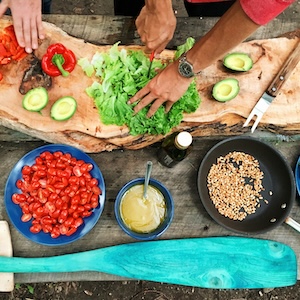
Supporting the Use of Indigenous Foods in Child Nutrition Programs
Research Location: 玛丽land, North Carolina, and Virginia, USA
Conservation Partners: Traditional Eastern Woodlands Foodways Alliance-Baltimore American Indian Center (BAIC), Seven Generations United Association, The Reed Center for Ecosystem Reintegration, USDA, Just Harvest, NCGrowth, IndigineiTEA
Faculty Mentors
Dr. Troy Wipongwii and Ben Friton
2025 Student Researchers
Jude Heatley '26, Major: Interdisciplinary Studies in Integrative Conservation
Chloe Thompson '27, Major: Public Policy; Minor: Integrative Conservation
Project Description
Traditional Indigenous Food Systems are essential for maintaining the biodiversity and resilience of ecosystems and sustaining the health, wellbeing, and culture of Indigenous communities and other human communities.
Eastern Woodland Economic Alliance (EWEA), an Indigenous-led economic development organization, is working with a diverse group of partners to cultivate a regional sustainable food supply chain centered around Indigenous plants, polyculture systems, technology, and traditional-ecological knowledge (TEK).
With a combination of programs and projects that include collaboration with academics, nutritionists, chefs, entrepreneurs, farmers, tribal communities, and tribal leaders, EWEA is currently working towards a regional 3-day summit in Fall 2025 or Spring 2026 to assess community assets (cultural, financial, human capital, land, etc.), and build a regional strategy between collaborators to build out this regional supply chain.
The students will support workshops, brainstorming sessions, and data collection. They will also develop objectives and key performance indicators to support the initiative.
Project ID - Format
25-004-25 - CRP Year
















